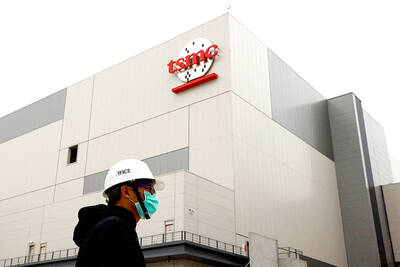US President Joe Biden on Thursday signed legislation aimed at cutting overseas shipping prices, calling the new law another move by his administration to curb stubborn inflation.
The law would stop “shipping companies taking advantage of American families, farmers, ranchers and businesses,” the president said at a signing ceremony for the broadly bipartisan measure — an indication of the White House’s urgency to show voters it is trying to bring down price increases stuck at a four-decade high.
“They raked in the profits and the costs got passed on, as you might guess, directly to consumers,” he added. “Sticking it to American families and businesses because they could.”

Photo: AFP
The shipping measure seeks to alleviate supply-chain bottlenecks at sea that were exacerbated by a spike in demand amid the COVID-19 pandemic. It directs the US Federal Maritime Commission to prevent ocean carriers from unreasonably refusing to fill open cargo space with US exports and to investigate late fees charged by shippers.
Biden said the law would “at least marginally” reduce inflation. It does not directly address elevated shipping costs that US importers and exporters have long complained are the heart of the problem, although backers of the bill predicted it would have an overall chilling effect on prices.
US importers and exporters say that Asia and Europe-based firms controlling 80 percent of global seaborne capacity are immune from US antitrust laws and need to be held accountable for pandemic-driven cost increases, an argument the White House has embraced.
“One of the factors affecting prices is this: nine major shipping companies consolidated into three alliances controlling the vast majority, mostly shipping in the world,” Biden said. “And each of these nine is foreign-owned. During the pandemic, these carriers increased their prices by as much as 1,000 percent.”
Attempts to “demonize ocean carriers” are not only inaccurate, but dangerous, because they undermine the ability to understand the root of US supply-chain problems, the World Shipping Council said in a statement.
“As long as America’s ports, rail yards and warehouses remain overloaded and unable to cope with the increased trade levels, vessels will remain stuck outside ports to the detriment of importers as well as exporters,” the council said. “Ocean carriers continue to move record volumes of cargo for our country and have invested heavily in new capacity — America needs to make the same commitment and invest in its land-side logistics infrastructure.”

Stephen Garrett, a 27-year-old graduate student, always thought he would study in China, but first the country’s restrictive COVID-19 policies made it nearly impossible and now he has other concerns. The cost is one deterrent, but Garrett is more worried about restrictions on academic freedom and the personal risk of being stranded in China. He is not alone. Only about 700 American students are studying at Chinese universities, down from a peak of nearly 25,000 a decade ago, while there are nearly 300,000 Chinese students at US schools. Some young Americans are discouraged from investing their time in China by what they see

Taiwan Semiconductor Manufacturing Co (TSMC, 台積電), the world’s largest contract chipmaker, yesterday reported record sales for the first quarter, which analysts attributed to solid demand for emerging technologies. Consolidated revenue totaled NT$592.64 billion (US$18.51 billion) in the January-to-March period, up 16.5 percent from a year earlier, but down 5.26 percent from the previous quarter, TSMC said in a statement. The first-quarter revenue beat analysts’ average projection of NT$579.5 billion, Bloomberg News reported. That performance lends weight to expectations that the world’s most valuable chipmaker would return to solid growth this year after weathering a post-COVID-19-pandemic cratering of smartphone and computer sales. TSMC is budgeting

MAJOR DROP: CEO Tim Cook, who is visiting Hanoi, pledged the firm was committed to Vietnam after its smartphone shipments declined 9.6% annually in the first quarter Apple Inc yesterday said it would increase spending on suppliers in Vietnam, a key production hub, as CEO Tim Cook arrived in the country for a two-day visit. The iPhone maker announced the news in a statement on its Web site, but gave no details of how much it would spend or where the money would go. Cook is expected to meet programmers, content creators and students during his visit, online newspaper VnExpress reported. The visit comes as US President Joe Biden’s administration seeks to ramp up Vietnam’s role in the global tech supply chain to reduce the US’ dependence on China. Images on

US CONSCULTANT: The US Department of Commerce’s Ursula Burns is a rarely seen US government consultant to be put forward to sit on the board, nominated as an independent director Taiwan Semiconductor Manufacturing Co (TSMC, 台積電), the world’s largest contract chipmaker, yesterday nominated 10 candidates for its new board of directors, including Ursula Burns from the US Department of Commerce. It is rare that TSMC has nominated a US government consultant to sit on its board. Burns was nominated as one of seven independent directors. She is vice chair of the department’s Advisory Council on Supply Chain Competitiveness. Burns is to stand for election at TSMC’s annual shareholders’ meeting on June 4 along with the rest of the candidates. TSMC chairman Mark Liu (劉德音) was not on the list after in December last